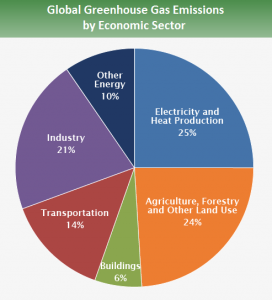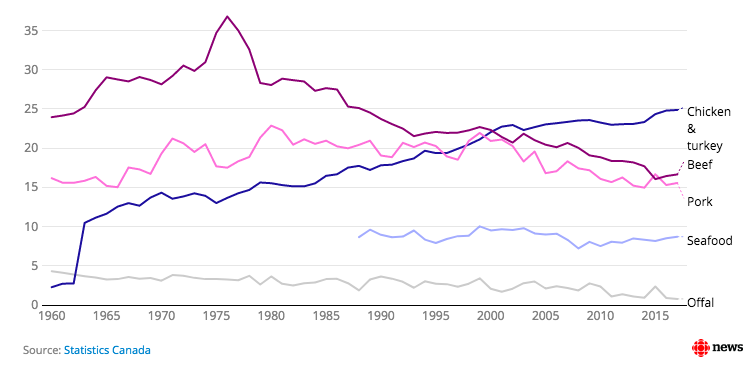Global climate change. It seems to be the topic of discussion nowadays and for good reason too. But often, people feel quite helpless in their role as a global citizen and question the efficacy of their adjustments. “Am I really helping the earth by walking instead of taking the car?”. “What damage can one plastic water bottle really do?”. If you feel that such adjustments just aren’t suitable for your lifestyle, perhaps there is something you can do and it starts with dinner.
This video explores the various implications of meat consumption based on research being conducted at the University of California.
About 14% of human-induced greenhouse gas (GHG) emissions come from fossil fuels burned during transportation. But would you be surprised if that the medium-rare steak on your dinner plate contributes just as much? You may be thinking, “Surely this 6 ounce steak couldn’t do that much damage” (or, here’s another vegan throwing grass at me).

Global Greenhouse Gas Emissions- IPCC
When you consider all the resources that go into raising a single cow, the numbers are staggering. In fact, livestock contributes 14% of GHG emissions. It’s not even just the meat. Producing dairy also plays a large role in this. Cows are ruminant animals which means that in order to raise them, cattle ranchers require large plots of land. While deforestation is also a contributor to global climate change, probably the biggest component is the fact that cows are just gassy. A single cow produces anywhere from 70 to 120 kg of methane a year. The problem with methane is that it is 25 times stronger than carbon dioxide as a GHG.
Consider this: 330g of carbon goes into a single serving of beef. That’s like driving your car 5 km. Switch to chicken and that number goes down to 52g. Fish, 40g. On the other hand, replace your proteins for lentils and you bring this number down to 2g. However, interestingly enough, while global meat consumption is predicted to double by 2050, Canadians have been consuming less beef and more poultry in the past 50 years.
“I think as Canadians we need to take a look and think about what a sustainable future looks like, and it doesn’t look like doing the same thing we are doing now. One of things is changing our diets.”
– Jennifer Sumner, Lecturer at University of Toronto

Meat Consumption Trends in Canada- CBC News
However, while a plant-based diet is environmentally sustainable, for most people it’s not convenient nor feasible. Furthermore, red meats provide many essential nutrients that are harder to obtain from a vegetarian diet. Moderation is everything and when it comes to your food, you only have to reduce your intake or make some simple adjustments. So maybe the next time you order a ribeye steak, consider opting for the seafood instead or walking to the restaurant.
Written by: Julia Lee
